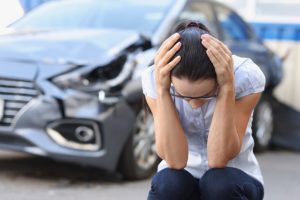Can I Get PTSD after a Car Accident?
March 2, 2022 | Car Accidents
Even a minor car accident is frightening, but if the accident is more violent, it can be as emotionally damaging as it is physically. Serious car accidents can lead to PTSD-like symptoms or even to full-blown PTSD in some cases.
If another driver’s negligence leaves you injured in a terrifying car accident, you need to address your entire range of losses, including your emotional pain and suffering. An experienced car accident attorney can help you do that.
Does PTSD Result from Car Accidents?
Yes, you can get PTSD from a car accident. The stress, terror, and pain you experience in the accident can lead to PTSD or PTSD-like symptoms, and it’s more common than you may realize. The sense of powerlessness associated with injuries from someone else’s negligence provokes immense anxiety, which can trigger PTSD to one degree or another. Generally, the more traumatizing the accident, the more likely it will trigger lasting PTSD.
Overview of Post-Traumatic Stress Disorder
Post-traumatic stress disorder (or PTSD) is a mental health condition triggered by a terrifying event. It’s easy to see how this definition can easily apply to a dramatic car accident. Even witnessing such events can lead to symptoms of PTSD. Typically, people who experience traumatic events such as serious car accidents ultimately adjust and move beyond the challenging symptoms of PTSD, but this isn’t always the case.
Living with PTSD for even a relatively short time can prove exceptionally difficult. PTSD interferes with how you function in your day-to-day life, which makes it a serious matter that you should address head-on in your car accident claim.
Signs of PTSD
While every case of PTSD is unique, various classic signs often indicate PTSD.
#1. Increased Anger or Irritability
If you have PTSD, you might find that you are angry more often than you used to be or are more easily irritated by the events of daily life. Your anger doesn’t have to be related to the car accident or even focused on it. PTSD can stir up negative emotions that feel as if they are free-floating, which makes them that much harder to conquer. If you are lashing out in anger, and it doesn’t feel like you or others express concern about this change in your behavior it can be post-accident PTSD.
#2. Intrusive Thoughts and Feelings
If you find that unusual thoughts or feelings (or both) are intruding into your everyday life at inopportune times and that you cannot control them, pay attention.
This pattern is a classic sign of PTSD. People with PTSD can get caught in an endless loop of intrusive thoughts and overwhelming feelings that make it difficult to move forward in their recovery and everyday lives. This cycle of intrusiveness can leave you feeling helpless and make it difficult to find moments of peace, which can exacerbate those feelings of anger discussed above.
#3. Accident Flashbacks
After being in an accident of nearly any kind it’s common to flashback to the fear you experienced. The more terrifying the event, the more terrifying the flashbacks, and when PTSD takes hold, these flashbacks can be extremely difficult to master.
Many people contemplate how an accident happened and what they might have done differently to have avoided it in the first place. If, however, the car accident resulted from someone else’s negligence, this can be difficult to deal with.
If you experience vivid flashbacks that repeatedly take you back to the car accident and are difficult for you to get out of your head, you may be experiencing PTSD. Sometimes, something as simple as sight, sound, or scent can whisk you right back to the violent car accident in vivid detail. Such flashbacks can lead to very negative consequences and make getting back behind the wheel next to impossible.
#4. Increased Anxiety
It’s common to experience increased anxiety after a car accident, but it can be PTSD-related if yours is interfering with your life.
The signs to watch out for include:
- Having panic reactions in new situations
- Your general level of anxiety has increased
- You can’t predict what will make you anxious
- You experience panic attacks (that you didn’t before)
- You are anxious about everything to do with driving
- You fear being near the spot where the accident happened
The increased anxiety you experience does not have to be associated with the car accident itself. In fact, it can take a very generalized form, which makes it even more challenging to overcome.
#5. Depression
Another driver’s negligence has injured you in a car accident, and some depression is only natural. However, if you feel plagued by depression or feel as if you are living under a dark cloud post-accident, it can be PTSD rearing its ugly head. Depression can interfere with every facet of your life, so always take it seriously.
#6. A Tendency to Self-Isolate
Sadly and ironically PTSD can cause you to engage in self-isolation just when you need the support of your friends, family, and loved ones the most. If you recognize this in your own experience, it’s time to take action. The symptoms of PTSD have a way of generating momentum and quickly spiraling out of control. Early intervention is the best antidote for PTSD.
#7. Sleep Disturbances
PTSD can follow you wherever you go even into your dreams. Many victims of PTSD experience new sleep disturbances that can include night terrors involving reliving the accident in one form or another.
#8. Extreme Fatigue
It is exhausting to deal with the stressful aftermath of a violent car accident and the symptoms of PTSD that accompany it. Many victims of PTSD are so busy trying to control their anxiety, the circumstances of their lives, their intrusive thoughts, and everything else that they are exhausted all the time. Further, extreme fatigue is a common symptom of depression and PTSD.
Take Action
PTSD can become a self-perpetuating cycle if you don’t get the help you need. Keeping a journal of your arduous journey can help you get a handle on what you are going through, address your concerns more directly with your doctor, and serve as a guide that illustrates the extent of your emotional pain and suffering for the insurance company.
Get the psychological treatment you need for your PTSD as soon as possible. Then, discuss your situation with an experienced car accident lawyer.
Some people feel embarrassed to discuss PTSD and similar mental struggles with an attorney. However, car accident lawyers know how traumatic crashes and injuries are. A lawyer is on your side and can provide you with peace of mind that they will handle the legal process and protect your rights. This frees up energy for you to focus on your psychological and physical healing.
You Need an Experienced Car Accident Attorney on Your Side

Chis Dixon, St. Louis Auto Accident Attorney
If a car accident caused by someone else’s negligence leaves you injured and suffering from symptoms of PTSD, you don’t have to face the challenging path forward alone. Reach out for your free legal consultation and case evaluation today. Seeking the financial recovery you deserve can assist with the rest of your recovery process.

